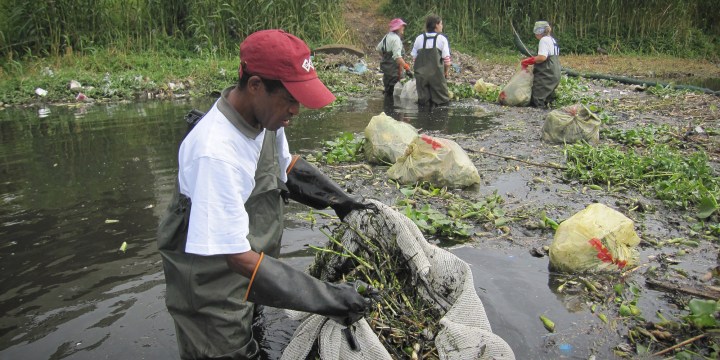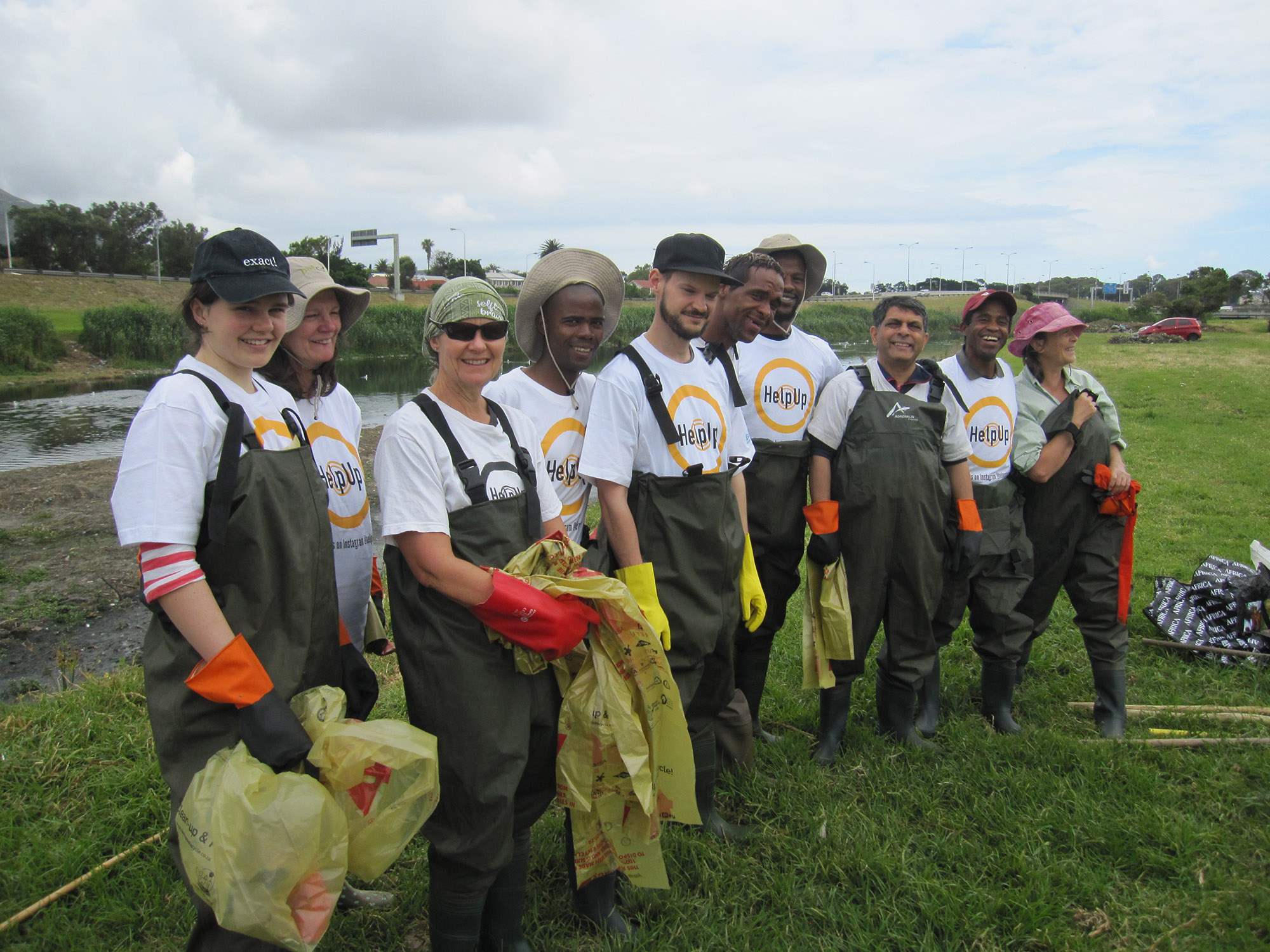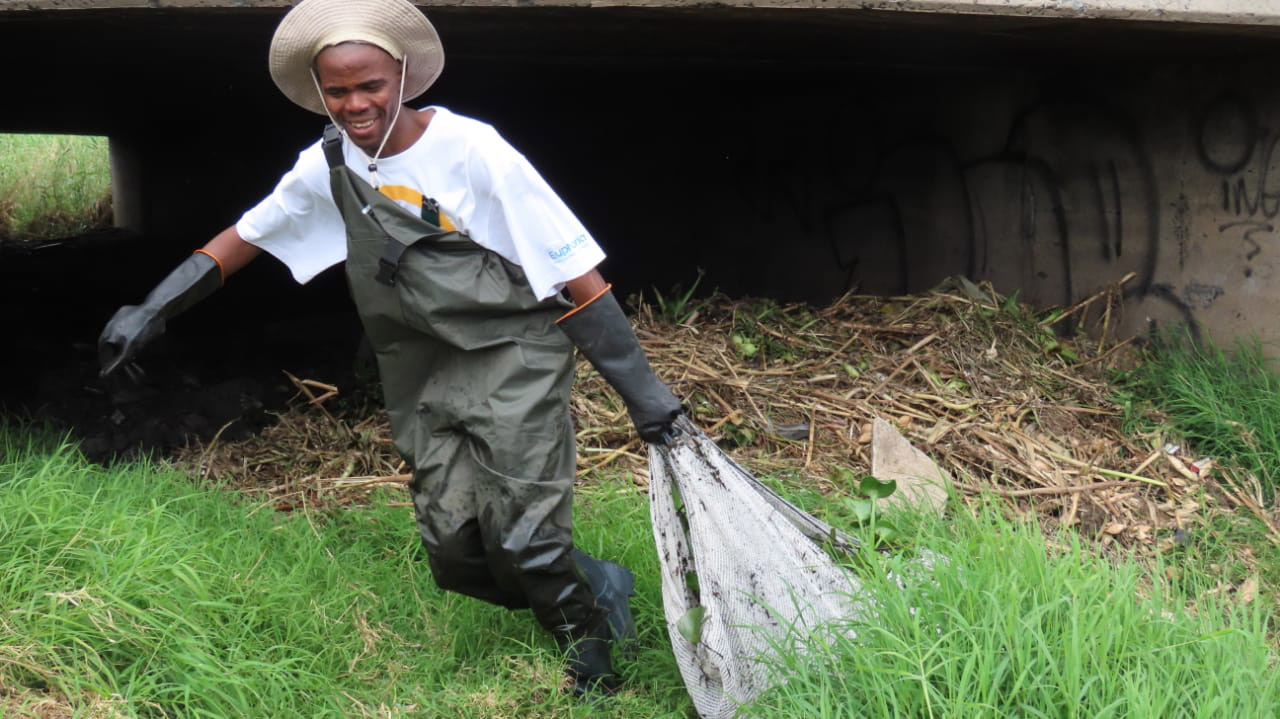MAVERICK CITIZEN: Clean Rivers
Collecting garbage, creating jobs, finding solutions, saving a river

Help Up, an initiative in Cape Town, has consistently been cleaning up the Black River Raapenberg channel, already clearing 4,000 bags of garbage that would have ended up in the ocean. They use volunteers and employ Avatars, homeless and formally unemployed folk, to clean up and collect tons of waste. But they are also proposing solutions.
Help Up is a solutions-based “compassionate disruption” initiative started by myself in September 2018. The aim of Help Up is to amplify awareness of our communal environmental responsibilities, as well as to activate people from all socio-economic sectors of our community and encourage them to work together on environmental projects. We have people who live on the streets, in informal settlements and some who reside in lovely suburban homes, working together on our clean-up crew. Our age profile is also interesting. Volunteers and Avatars range between the ages of 18 and 60.
At Help Up, we are all the same, whether volunteer or avatar, we work together as a team to collect rubbish from rivers and drive change through the example of action.

Help Up Muckies ready for action! Nicole and Linda Oosthuizen, Liz Sparg, Sinethemba Quaka, Julian Coetzee, Simmy Engelbrecht, Mosa Mocumi, Abdulla Parker, Rudie Basson and Janet Ranson. (Photo: supplied)
Help Up Avatars are homeless and formally unemployed people who work as paid volunteers on our clean-ups. They are not viewed as labourers, but rather respected as the hard-working and dedicated contributors to our missions that they are. We do not look upon Help Up Avatars as charity cases and do not provide handouts. We pay good money for jobs well done at Help Up. Help Up projects are funded through pledges from the public, collected on our crowdfunding page.
Since January 2019, Help Up has activated 49 clean-ups and collected a total of 39 tons of waste. We have collected a total of 35 tons of plastic waste from inside the Black River Raapenberg channel alone over 33 weeks, cleaning every Sunday morning. We work consistently and on the same area of the river so that we can report on what we find as well as attempt to improve the quality of life for the birds that call that section of the river their home. To provide some context, Help Up has prevented the equivalent of 4,000 full bags of garbage from entering the ocean since February this year.

Sinethemba Quaka hauling hyacinth from the Black River. (Photo: supplied)
It costs the City of Cape Town eight times more to clean rubbish out of a river than it costs to clean out the same volume from a bin. Help Up is fully aware of the cost-saving that our weekly clean-ups contribute to the city’s bottom line. We agree with the city that solutions must be found at the source in order to stem the tide of waste being dumped into our rivers and oceans each year.
A general attitude shift is necessary, within our communities as well as with higher-ups at the city council, some of who maintain that cartoon characters and expensive celebrity events are the best way to forge new attitudes and agreements within communities in order to stem the waste overload that we are faced with solving every day in this city. While I don’t disagree that media engagement is critical to any successful drive, I do think that a more hands-on solution is required to mitigate our current and seemingly never-ending waste crisis.
I want to focus on “source” for this piece. What is the source of all this waste? On the one hand, we have a society that is addicted to convenience. We believe we can do whatever we like, and some faceless entity will sort it out. This has to change from a consumer point of view, with people making smarter choices at the supermarket shelf, committing to purchasing items packaged only in recyclables, with the full awareness that once that item is recycled and purchased again for use, it too becomes unrecyclable waste. Heat degrades certain plastics and toxic substances can leach from that packaging into the food we eat. Think about that next time you purchase your take-away in a polystyrene package and warm it up in the microwave. Consider that the heat is degrading the expanded polystyrene and that toxic fumes are very probably leaching into your food. Not so appetising is it?
The next element of the “source” discussion is the dumping of waste. Dumping is an ongoing issue in Cape Town. People still throw garbage, cigarette butts and other waste from car and taxi windows – this garbage reaches the rivers and oceans through stormwater outlets.
Dumping by those in the building industry is also a massive issue. If you are having renovations done to your home, you are charged by your builder for rubble removal. This waste is supposed to be taken to a designated dumping site. That’s just too much hassle for some builders – they drop it by the side of the road, or into a canal when they think no one is looking. In some areas, they don’t even care who sees them do it. Industrial dumping into river channels is far too common and rarely reported. The Renew the Elsieskraal River group have collected large volumes of fatty waste substances and noted a regular dump of blue dye into the river upstream from their clean-up site in Pinelands. Help Up regularly picks up building waste on our clean-ups too. The City of Cape Town’s Solid Waste Department works tirelessly to clean all this up and by communicating, through various community platforms, the importance of reporting dumping so that fines can be issued, and arrests made. This needs to be amplified by more community awareness.
Remember when Day Zero was looming and everybody was watching their neighbours to see if they were still washing their bed linen and towels every week? Citizen vigilance is a great way to keep people, who do not comply with necessary laws, in check. The Public Broadcaster, as well as eTV and DStv could easily slip issues of dumping and trashing into the storylines of their telenovelas to drive home “if you trash you are trash”, and so on. Come to think of it, they could also have their most glamorous and admired characters joining a river clean up regularly.
The third “source” issue comes from, what is referred to as, The Sand Suburbs. This title refers to informal settlements and other low-income areas, which do not have access to the same level of municipal services that tarred suburbs would. Rates and taxes go a long way in getting something done and local councillors get their ears chewed off if something is a mess in the tarred ‘burbs of Cape Town.
In the sand suburbs, things are vastly different. Narrow lanes and lack of infrastructure make it challenging to clear an area of waste on a regular basis. Also, rubbish bags are in short supply, so the loose plastic garbage is thrown next to the river in order to keep the stench and rats at bay. When it rains, the rubbish flows downstream and into the ocean. The high rate of unemployment in sand suburbs also makes driving a My Pretty Neighbourhood campaign low down on the to-do list when the kids are crying for bread and you need to find the money for formula and school shoes. Yes, poverty is a huge factor in the issue of waste management. It grinds my gears when people comment on our social media pages about how disgusting people are, when those of us in homes, with jobs and plumbing, couldn’t possibly understand how much of a struggle it is to exist on the bread and crime line.
Help Up has recently initiated a Franchises are Free pilot project in Langa, Cape Town. This is an app-based satellite clean-up initiative where a resident of Langa is provided with all the tools necessary to host his own clean-ups, hire employees and report on the clean up with data and photographs. Help Up provides the safety gear, bags and pays the franchisee the contracted amount including the wages for their staff for the day, once the full report is uploaded to our portal and the bags collected by the city’s Solid Waste Department.
Our first clean up was a great success with 40 bags being collected from a stormwater canal in Langa by two people in just three hours. Three days later the area cleaned is still pristine and we are doing it all again this coming weekend, thanks to more budget being made available through our inspired pledgers. We have a long way to go but I am confident that with consistency, determination and dedication, this project will start to bear fruit in the form of a reduction in river garbage downstream in a few short weeks. Franchises are Free requires that the person works on our river clean-ups in order to learn about the importance of clean water and that educational element and relationship building is key to the success of this project.
From the perspective of efficiency analytics, it is relatively simple to create scalable solutions to issues that are easily clouded by politics and societal drama. Just apply a practical analysis of what needs to be achieved and create a platform for relevant partners to engage and earn from the experience. If there is a resource and access issue in sand suburbs and it costs eight times more to clean from a river than it does a bin, it makes practical sense to create depots for paid waste collection in sand suburbs. Trash for Cash depots could go a long way in alleviating the issues of waste collection for the City of Cape Town, as well as keeping our rivers garbage free.
If the industry intends to continue to manufacture plastic for packaging, Trash for Cash would either become a sustainable solution or, very quickly, result in a more economically viable packaging solution being created by the industry.
Perhaps one which takes into consideration the true cost of plastic packaging to the environment. MC
Facebook and Instagram: @helpuptoday
When not mucking around in dirty rivers with the Help Up team on weekends, Georgia McTaggart consults as an Efficiencies Analyst for a data collection company specialising in actionable and achievable solutions for the Fast-Moving Consumer Goods industry.





















 Become an Insider
Become an Insider